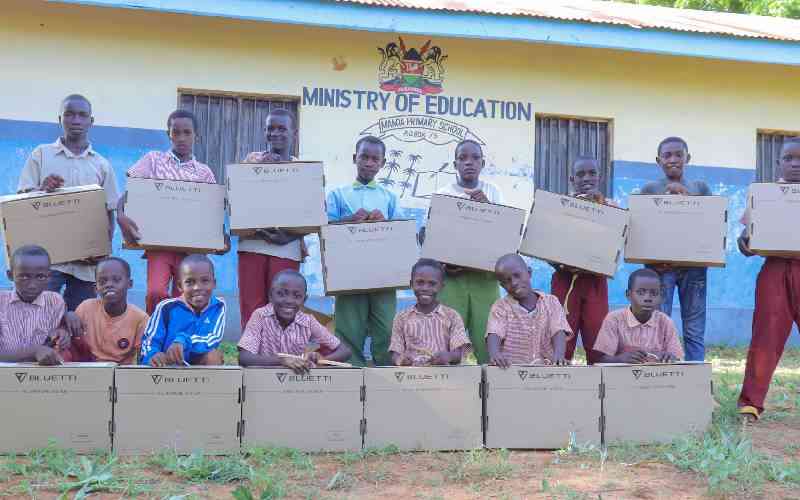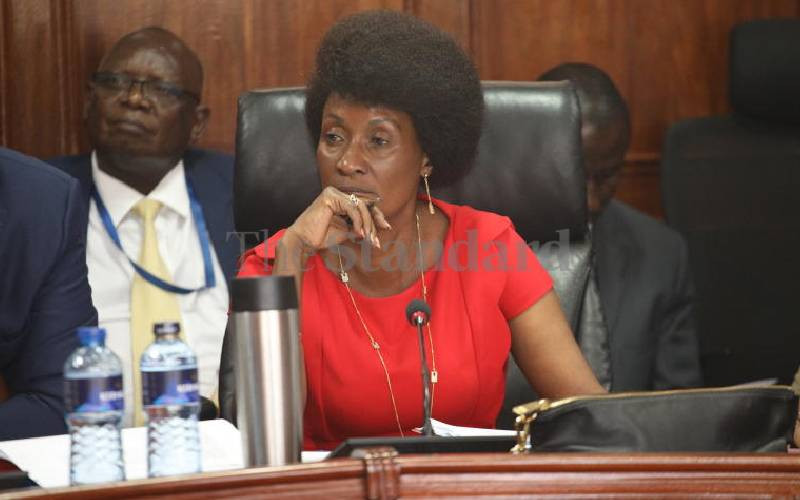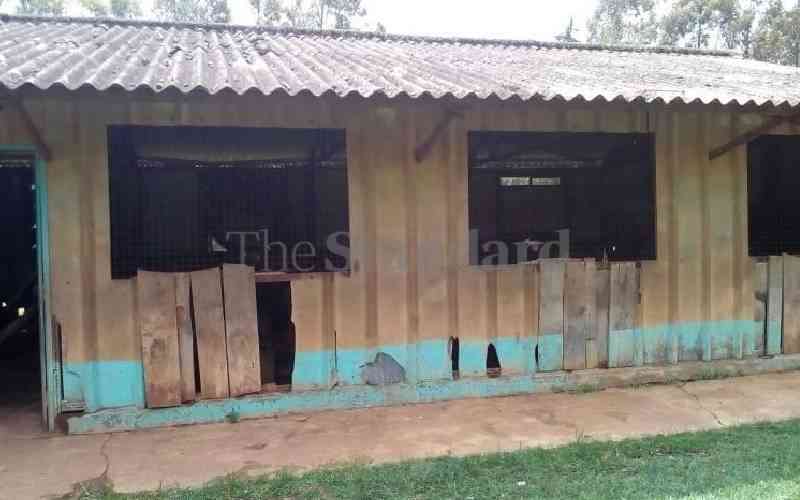 |
|
Bura Primary School chairman Muhumed Maalim Yussuf (right) with Mustapha Khalib, a parent. Most buildings at the school have been recommended for demolition. [PHOTOS: ADOW JUBAT/STANDARD] |
By ADOW JUBAT
Garissa, Kenya: The rickety desk creaks as Sudhow Abdi, 13, a Standard Seven pupil at Bura Primary School in Fafi Constituency, Garissa County, adjusts her sitting position.
The wooden desk creaks even louder as she lifts up her hand to answer a question. And as the English lesson continues, Abdi is torn between listening to the teacher and preventing the desk from crumbling. Huge cracks on the walls of her class exacerbate her plight. Strong winds blow through the crevices blowing away her tattered dress.
When the teacher asks her to repeat what she had just said, Abdi stares at her blankly. The teacher lambasts her, but before she concludes, a she-goat roaming in the school compound with it its kids storms into the classroom through a huge crack scaring learners.
Two boys volunteer to chase it away before the teacher continues with the lesson. The plight of pupils at Bura primary mirrors what happens in many schools across the country. Students sit on rickety desks or on the ground, learn under trees, lack teachers, books and other infrastructure that helps the teaching and learning process.
Yet, it is the students in such schools who the Government is keen to offer free laptops. In its Sh1.6 trillion Budget presented in Parliament last week, the Government allocated Sh53 billion for the laptop programme.
Facilities
The allocation has caused uproar among education stakeholders with Kenya National Union of Teachers (Knut) noting it is misplaced.
Students, especially those learning in poor conditions, do not know if they should rejoice and wait anxiously for the laptops.
At Fafi primary, news about the laptops has not caused any excitement.
Students at the only boarding primary school in the county with facilities for both boys and girls, have a myriad of problems to deal with. They are using facilities, including those in boarding section, that are inhabitable. The Government on August 17 last year condemned most structures in the school. The World Bank constructed the school in 1976. Public works and education officials in a report that condemned the institution described it as a disaster in waiting.
In the report, which was copied to Ministry of Education and other stakeholders, recommended for immediate demolition of entire school’s eight classes and administration block, which is beyond repair, according to the report.
That the boys and girls school has fallen from grace to grass is not a secret. The school has been performing dismally in the last five years prompting parents to withdraw their children.
Mustapha Khalib, 30, a resident of Bura town, wonders of what use will be the laptops in schools such as Bura primary, where there are no decent classrooms and adequate teachers.
Khalib, who has siblings in the institution, asserts that the laptops are not a priority to most schools with poor infrastructure, especially those in North Eastern.
Stay informed. Subscribe to our newsletter
Fafi DEO Daniel Ayeta, who acknowledges receiving the report that condemned the school, said his office has shared the document with all relevant stakeholders, among them Ministry of Education, local CDF office, Unicef and well-wishers.
“The assessment report condemned most of the buildings at the school. However that doesn’t mean learning should be disrupted or stopped,” he says.
 The Standard Group Plc is a
multi-media organization with investments in media platforms spanning newspaper
print operations, television, radio broadcasting, digital and online services. The
Standard Group is recognized as a leading multi-media house in Kenya with a key
influence in matters of national and international interest.
The Standard Group Plc is a
multi-media organization with investments in media platforms spanning newspaper
print operations, television, radio broadcasting, digital and online services. The
Standard Group is recognized as a leading multi-media house in Kenya with a key
influence in matters of national and international interest.
 The Standard Group Plc is a
multi-media organization with investments in media platforms spanning newspaper
print operations, television, radio broadcasting, digital and online services. The
Standard Group is recognized as a leading multi-media house in Kenya with a key
influence in matters of national and international interest.
The Standard Group Plc is a
multi-media organization with investments in media platforms spanning newspaper
print operations, television, radio broadcasting, digital and online services. The
Standard Group is recognized as a leading multi-media house in Kenya with a key
influence in matters of national and international interest.









